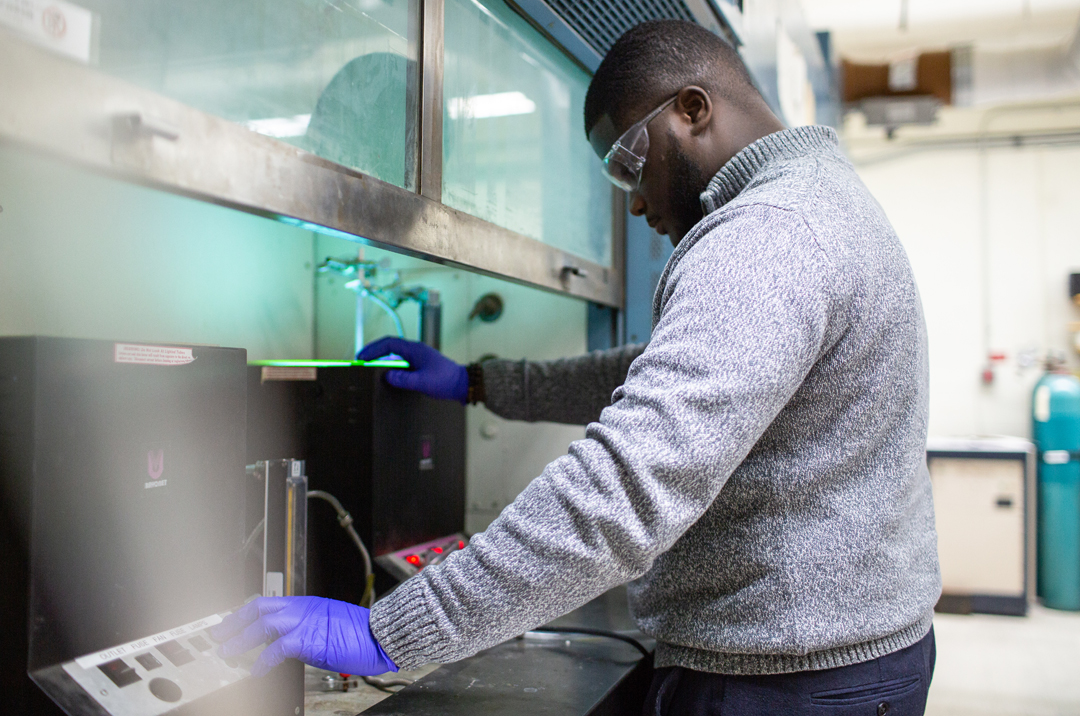Student to Student: Sustainable systems
By Ibrahim Cisse
Jaime Huynh, RIT Student
While he was an Environmental Science BS major, Ibrahim Cisse spent two years working with Dr. Gerald Takacs in his research group at the School of Chemistry and Materials Science. Ibrahim is currently a first year Ph.D. student in RIT’s Sustainability program.
My undergraduate research focused on testing hydrophilicity of Polyethersulfone membranes. Polytethersulfone (PES) is a hydrophobic membrane for water filtration and ozone which is the most effective FDA approved water purification for eradicating toxins that are found in water. My research had the goal to investigate the Ultraviolet photo-oxidation of Polyethersulfone with 253.7 and 184.9 nm wavelengths where the 184.9 nm radiation produces ozone and the 253.7 nm photons are transmitted through the oxygen to initiate modification of the Polyethersulfone membrane’s surface. Ultimately, the main target was to increase the hydrophilicity of the membrane.
The testing of our results was done through several key methods such as UV photo-oxidation, X-ray photoelectron spectroscopy (XPS), water contact angle measurements and Atomic Force Microscopy (AFM). All of which will lead to conclude whether we see an increase in hydrophobicity due to oxidation of the surface. I have spent approximately two years on this research, and we successfully found an increase in Polyethersulfone membrane’s hydrophilicity which can only mean it has the potential to improve water purification/ filtration to provide safe drinking water on a large scale.
How did you come to study sustainable systems at RIT?
I came to study sustainable systems at RIT, because of my interest in mitigating climate change in order to conserve resources and provide a safe environment for future generations to come. I always emphasize that it is our duty to take care of the environment and our society as a whole and this program is giving me the tools and skills needed in order to one day make an impact in the world.
What motivated you to participate in your particular area of research?
During my undergraduate, researching on testing hydrophilicity of Polyethersulfone attracted me because of my interest in physical chemistry and how to apply this particular aspect of chemistry to sustainability. I became interested in the topic because of the larger impact this research could have, especially when it comes to access safe drinking water. I am originally from Cote d’Ivoire (West Africa), and it is true to admit that lack of safe drinking water is one of the region’s leading problem affecting millions of people. Through this research, I believe that it could open the gates to new findings that will enable access to safe drinking to communities living in remote areas in the world while enhancing technological discovery for the greater good.
Where there any obstacles you had to overcome?
The main obstacle I encountered during these years, was developing knowledge in physical chemistry which I was never exposed to through previously. I was able to gain confidence and began to trust in the work that we were doing and what I was bringing to the table with the guidance and support of Dr. Takacs, who always believed in me and helped develop the skills and knowledge required for the research over the years.






